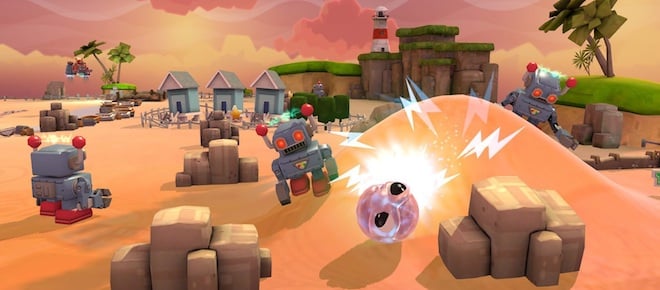Orbis might kill used PlayStation games–how dumb
The move, if it materializes, could mean fewer new games on the market
In this video game image released by Sony Computer Entertainment America, a scene is shown from “Little Deviants.” (AP Photo/Sony Computer Entertainment America)
Share

If you’re a gamer, last week saw the emergence of a particularly nasty rumour–that Sony’s next-generation PlayStation will not play used games.
According to Kotaku, which cited inside sources, the next console is code-named Orbis and will be released for the holiday season of 2013. More importantly, the device will lock new games to a PlayStation Network account, thereby rendering them useless to anyone other than the initial buyer.
Sony has a history of trying to lock down its stuff, from copy-protected CDs to proprietary memory cards, which is why many are taking the rumour seriously.
It’s no secret the video game industry hates used games. When chains such as Gamestop/EB Games sell a customer a used game, publishers don’t see a nickel. What makes the studios especially angry is that they spend millions marketing their products, yet the retailers devote more floor space to used games. It’s the free-ride argument.
In the U.S. alone, this costs publishers an estimated $2 billion a year, more than piracy. It’s no wonder they’re looking to fight back, something they’ve been doing with efforts such as “Project $10,” an early form of what Sony is rumoured to be contemplating. Under this scheme, players get a one-time pass to access the online features of their new game. If they trade that game in, the next owner has to pay $10 for a new pass.
(As a brief aside, I’ve been privately bemoaning the state of video games for a few months before the Orbis rumour surfaced. At the risk of sounding like an old codger, I’ve been pining for the good old days of consoles, where you could simply pop your disc–or cartridge–into the system and be up and running in no time. Now, virtually every single game requires multiple account signs-ins, downloads and system updates. It’s not uncommon for games to take anywhere from five to 45 minutes to start up now. If I wanted to wait around and deal with never-ending updates, I’d play games on a PC.)
Anyway, if the company’s rumoured plan is true, it could be the company’s dumbest move ever, as the Motley Fool put it. The scheme, in fact, is likely to result in less money for Sony, not more.
The scenarios are simple to predict. If Sony were the only console maker to try such a move, it would be blown out of the water as gamers flocked to Microsoft and Nintendo. It’s safe to assume, then, that all three are receiving similar pressures from the big publishers, so if one locks out used games, all of them will.
Let’s do the math. If a gamer buys 10 games a year at $60 a pop and returns each one of them for an average trade-in value of $25, he or she has a total yearly net expenditure of $450. Now, if that trade-in value is taken away, that gamer is likely to buy fewer games. If the same $450 is spent, that’s only seven games a year.
That means one of two things: game publishers will either have to produce fewer games or they’ll have to sell them for less–though, with budgets on games continuing to escalate, the latter is not really an option.
Is that a good thing? Perhaps–it could mean that fewer bad games will be made. But more realistically, studios will place even bigger bets on fewer titles. That means less risk, more sequels, less originality. That’s bad. Also, with fewer games made, the effects of failures will be more pronounced. If one big-budget game doesn’t do as well as hoped, studios will close and jobs will be lost.
There’s another factor putting pressure on big-budget games: mobile games. Many game makers are finding it more lucrative to quickly design smaller and simpler games for smartphones and tablets. Such games are naturally sold for much less, usually for only a few dollars a pop, but the potential to sell larger volumes has many developers seeing dollar signs.
Large game studios are dismissive of such games as the “farm leagues” and rightly say they’ll never rival the console experience, but that’s missing the point. Just as the “post-PC” world is fragmenting computing among various devices, so too is a “post-console” world emerging. People may get their gaming fill on the bus ride back from work and feel a little less inclined to fire up the console when they get home. That inevitably affects console game sales.
The better way for publishers to limit the impact of used game sales on their bottom lines is to move further into digital distribution–whether it’s through download services such as Steam or streaming ones such as OnLive. By eliminating discs altogether, game publishers can kill off both used games and piracy in one fell swoop.
But switching completely to digital distribution would require publishers to do two things they’ve thus far been reluctant to do. First, with digital distribution significantly reducing costs, they’d have to pass on those savings to consumers in the form of lower prices–imagine buying the next Call of Duty for $30, rather than $60! Second, the studios would have to get involved in demanding better broadband access, both in terms of adoption and usage caps. They need to be able to get their wares to everyone and games are, after all, beasts when it comes to chewing up monthly data.
Given that, it’s no surprise the industry is instead railing against used games. It’s the far easier thing to do.